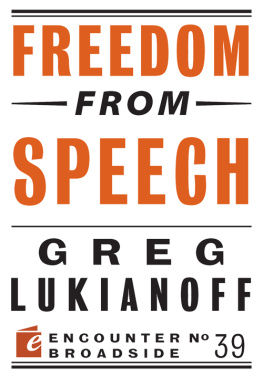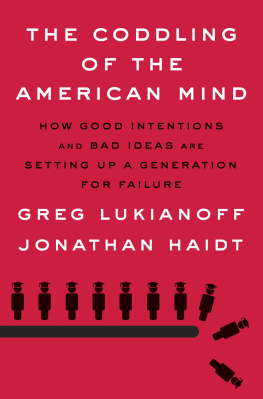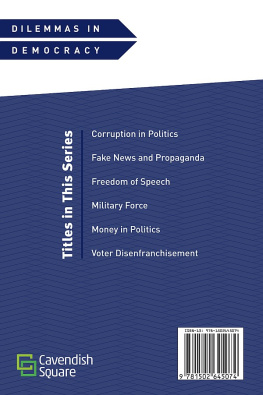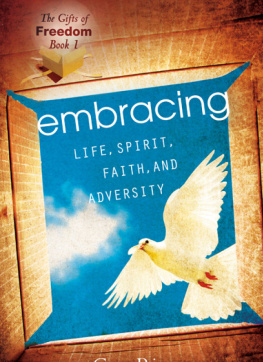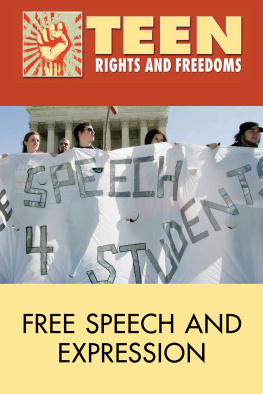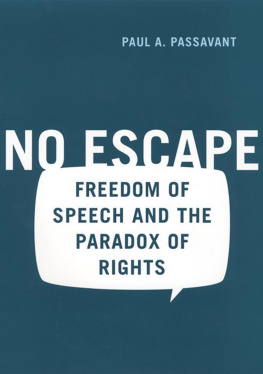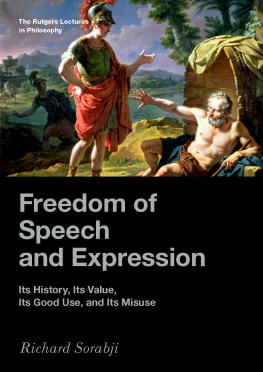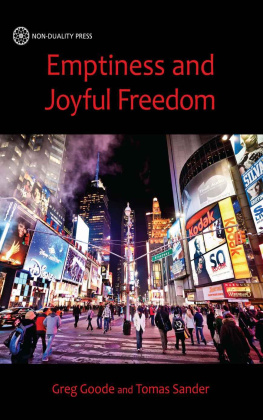T HE ACADEMIC YEAR OF 2013-14 was a strange time for freedom of speech in the United States. Despite the continued strength of the First Amendments legal protections for unpopular speech, stories about individuals (famous or otherwise) caught saying something offensive to someone or some group have become a media obsession. It seems as if every day brings a new controversy regarding the purportedly offensive remarks of a celebrity, an official, or an ordinary citizen, followed by irate calls for the speaker to suffer some sort of retribution.
In the spring of 2014, recordings of racist remarks by Los Angeles Clippers owner Donald Sterling dominated CNN coverage for months, inspiring public outrage that likely will result in Sterlings losing his basketball franchise. Not long before that, the controversy of the day involved Phil Robertson, the patriarch of A&Es popular television show Duck Dynasty, for making insulting remarks about homosexuals and African Americans. That incident was preceded by the fall of Paula Deen, whose career collapsed (perhaps temporarily) after she admitted to having used a racial epithet at some undefined time decades in the past. The list of celebrities who have made headlines for allegedly offensive statements seems to be ever expanding; high-profile offenders include Gary Oldman, Don Imus, Mel Gibson, Jerry Seinfeld, Isaiah Washington, and Alec Baldwin.
Oftentimes, the speakers are not merely vilified but even lose their jobs over their comments. Juan Williams at NPR, Rick Sanchez and Roland Martin at CNN, and Martin Bashir and (again) Alec Baldwin at MSNBC all lost their media positions because of controversial remarks. Admittedly, many of the offending comments were not particularly sympathetic, but the publics appetite for punishing attempts at candor gone wrong, drunken rants, or even private statements made in anger or frustration seems to be growing at an alarming rate.
Even satirical comedian Stephen Colbert ran afoul of the speech police when he made a joke on his show that used racial insensitivity to mock racial insensitivity. The #CancelColbert movement quickly picked up steam but ultimately did more to produce Twitter chatter than to threaten the career of the popular comedian. It did, however, shine a light on the thought pattern of the modern American censor: there must be zero tolerance for anything that anyone might consider offensive, regardless of the context.
The publics appetite for punishing attempts at candor gone wrong, drunken rants, or even private statements made in anger or frustration seems to be growing at an alarming rate.
And then there was the case of the Mozilla Corporations Brendan Eich, who was pressured to resign from his brief stint as the companys CEO after it re-emerged that he had donated $1,000 to the campaign for Californias Proposition 8, a ballot initiative opposing same-sex marriage, back in 2008. The Eich incident was troubling on many levels. Not only did it demonstrate a surprisingly short national memory until fairly recently, the majority of Americans opposed gay marriage, including both President Obama and Hillary Clinton but it also seemed to indicate that some religious or social conservatives would have to choose between their beliefs and their professions. Eichs coerced resignation sent such a disquieting message that a coalition of 58 gay-rights activists, scholars, columnists, and pundits across the ideological spectrum signed a statement titled Freedom to Marry, Freedom to Dissent: Why We Must Have Both. The statement warned that the Eich case signal[ed] an eagerness by some supporters of same-sex marriage to punish rather than to criticize or to persuade those who disagree.
Some argued that the Eich incident was not about free speech, because free speech binds only governments and does not prevent private employers from firing employees (or encouraging them to step down) based on their beliefs. This argument is incorrect. Its true that what happened to Eich was not an actual First Amendment violation, but that does not mean it had nothing to do with free speech.
Though often used interchangeably, the concept of freedom of speech and the First Amendment are not the same thing. While the First Amendment protects freedom of speech and freedom of the press as they relate to duties of the state and state power, freedom of speech is a far broader idea that includes additional cultural values. These values incorporate healthy intellectual habits, such as giving the other side a fair hearing, reserving judgment, tolerating opinions that offend or anger us, believing that everyone is entitled to his or her own opinion, and recognizing that even people whose points of view we find repugnant might be (at least partially) right. At the heart of these values is epistemic humility a fancy way of saying that we must always keep in mind that we could be wrong or, at least, that we can always learn something from listening to the other side. Free speech as a cultural value will be my primary concern in this Broadside, not the state of First Amendment jurisprudence. And the national obsession with punishing jokes, rants, drunken tirades, and even deeply held beliefs shows a growing hostility toward free speech as a cultural value.
Given this climate, it is unsurprising that American higher education, where unpopular speech has been restricted for decades, has earned media attention for being especially intolerant in the past year. My organization, the Foundation for Individual Rights in Education (FIRE), which exists to combat violations of student and faculty free speech and other constitutional rights, has been busier than ever in 2013-14. In this Broadside, I will be discussing at length recent campus incidents and trends, including disinvitation season (the increased push by faculty and students to disinvite guest speakers on campus) and the emergence of demands for trigger warnings (written and/or spoken warnings to students that books, films, or other course material might be emotionally upsetting) on campus.
But those examples are just two symptoms of an academic environment that has long been souring on robust free speech and expression. Alan Charles Kors and Harvey Silverglate extensively exposed the rise of speech codes and political correctness on campus in their 1998 book The Shadow University: The Betrayal of Liberty on Americas Campuses, and I updated and built upon their work in my 2012 book Unlearning Liberty: Campus Censorship and the End of American Debate. In Unlearning Liberty, I argued:
Administrators [on campus] have been able to convince well-meaning students to accept outright censorship by creating the impression that freedom of speech is somehow the enemy of social progress. When students began leaving college with that lesson under their belts, it was only a matter of time before the cultivation of bad intellectual habits on campus started harming the dialogue of our entire country. The tactics and attitudes that shut down speech on campus are bleeding into the larger society and wreaking havoc on the way we talk among ourselves.



